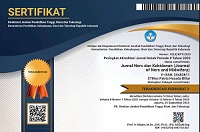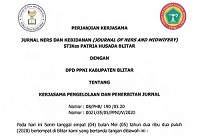Factor Predictors of Prolonged Stress of University Students Taking Online Learning
DOI:
https://doi.org/10.26699/jnk.v9i1.ART.p092-098Keywords:
stress, online, studentAbstract
The Covid-19 pandemic has caused changes all aspects of people's lives today, especially in the world of education which requires all elements of education to adapt and continue the rest of the semester with online learning. This condition caused prolonged stress, a condition where there is physical, emotional, and mental fatigue caused by excessive. This research was conducted on April 2021 with the aim of identifying predictors of prolonged stress of students taking online learning. The method used descriptive approach. The data analysis used factor analysis with KMO and Bartlett's Test methods. The population in this research were all students of nursing study program ITSK RS dr. Soepraoen Malang total 815. The sampling technique used accidental sampling with total sample of 279. The instrument used Maslach Burnout Inventory which distributed online by google forms. The results showed that almost all of the students who experienced mild to moderate prolonged stress were regular students with a total of 252 people (90.3%), low to moderate respondents were unmarried, organizational factors causing prolonged stress were institutional support, more than half of the respondents, 27 people (9,7 %) who felt adequate support from the institution experienced prolonged stress in the mild to moderate category. The dominant factor was student's status as a regular student or assignment or study permit with the significance value was 0.001 <0.05. It is recommended that students actively seek support systems from family and friends as well as educational institutions that are consistent in supporting students
References
Alimah, S., & Swasti, K. G. (2018). Gambaran Burnout pada Mahasiswa Keperawatan di Purwokerto. Jurnal Keperawatan Soedirman, 11(2), 130. https://doi.org/10.20884/1.jks.2016.11.2.709
Anhusadar, L. (2020). Persepsi Mahasiswa PIAUD terhadap Kuliah Online di Masa Pandemi Covid 19. KINDERGARTEN: Journal of Islamic Early Childhood Education, 3(1), 44. https://doi.org/10.24014/kjiece.v3i1.9609
Bao, W, et all. (2020). COVID-19 and online teaching in higher education : A case study of Peking University. March, 113–115. https://doi.org/10.1002/hbe2.191
Cahyati, N., & Kusumah, R. (2020). Peran Orang Tua Dalam Menerapkan Pembelajaran Di Rumah Saat Pandemi Covid 19. Jurnal Golden Age, 4(01), 4–6. https://doi.org/10.29408/jga.v4i01.2203
Calvarese, M. (2015). The effect of gender on stress factors: An exploratory study among university students. Social Sciences, 4(4), 1177–1184. https://doi.org/10.3390/socsci4041177
Gerber, et al. (2013). Burnout and mental health in Swiss Vocational students: the moderating role of physical activity. Journal of Reasearch on Adolescence, 25(1), 63-74. DOI: 10.1007/S10912-009-9093-5
Goldschmidt, K., & Msn, P. D. (2020). The COVID-19 pandemic: Technology use to support the wellbeing of children. Journal of Pediatric Nursing, xxxx, 3–5. https://doi.org/10.1016/j.pedn.2020.04.013
Gugus Tugas Percepatan Penanganan COVID-19 Indonesia. (2020). Data COVID-19 Global dan Indonesia. https://covid19.go.id/
Herliandry, L. D., Nurhasanah, N., Suban, M. E., & Kuswanto, H. (2020). Pembelajaran Pada Masa Pandemi Covid-19. JTP - Jurnal Teknologi Pendidikan, 22(1), 65–70. https://doi.org/10.21009/jtp.v22i1.15286
Hirschle, A. L. T., & Gondim, S. M. G. (2020). Stress and well-being at work: A literature review. Ciencia e Saude Coletiva, 25(7), 2721–2736. https://doi.org/10.1590/1413-81232020257.27902017
Khan, S. A., & Khan, R. A. (2017). Chronic Stress Leads to Anxiety and Depression. Ann Psychiatry Ment Health, 5(1), 1091
Lee, A. (2020). Wuhan novel coronavirus (COVID-19): why global control is challenging?. Public Health, January, 19-21. https://doi.org/10.1016/j/puhe.2020.02.001
Moore, Christine ; Kolencik, J. (2020). Acute depression, extreme anxiety, and prolonged stress among Covid-19 frontline healthcare workers. Psychosociological Issue in Human Resources Management, 8(1)
Nursalam. (2015). Metodologi penelitian ilmu keperawatan:pendekatan praktis, ed. 4. Jakarta: Salemba Medika
Ratnasari, Anisa;Prasetyo, A. (2018). Hubungan Antara Persepsi Dukungan Organisasi Dengan Stres Kerja. Empati, 6(2), 70–76
Saputro, F. B., Somantri, M., & Nugroho, A. (2017). Pengembangan Sistem Kuliah Online Universitas Diponegoro Untuk Antar Muka Mahasiswa Pada Perangkat Bergerak Berbasis Android. Pengembangan Sistem Kuliah Online Universitas Diponegoro Untuk Antar Muka Mahasiswa Pada Perangkat Bergerak Berbasis Android, 19(1), 15–21. https://doi.org/10.12777/transmisi.19.1.15-21
Scott, S. B., Sliwinski, M. J., Mogle, J. A., & Almeida, D. M. (2014). Age, stress, and emotional complexity: Results from two studies of daily experiences. Psychology and Aging, 29(3), 577–587. https://doi.org/10.1037/a0037282
Suhita, A. A., & Subandi, S. (2018). Peningkatan Kesejahteraan Psikologis Wanita Menikah dengan Gangguan Fertilitas Idiopatik melalui Terapi Narima Ing Pandum. Gadjah Mada Journal of Professional Psychology (GamaJPP), 4(1), 42. https://doi.org/10.22146/gamajpp.45348
Tanaka, K. I., Yagi, T., Nanba, T., & Asanuma, M. (2018). Application of single prolonged stress induces post-traumatic stress disorder-like characteristics in mice. Acta Medica Okayama, 72(5), 479–486. https://doi.org/10.18926/AMO/56245
Downloads
Published
How to Cite
Issue
Section
License
Copyright (c) 2022 Jurnal Ners dan Kebidanan (Journal of Ners and Midwifery)

This work is licensed under a Creative Commons Attribution-ShareAlike 4.0 International License.






